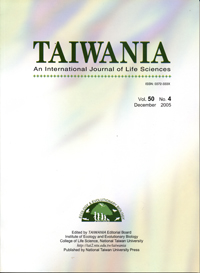Research Paper
Woody Floristic Composition, Size Class Distribution and spatial Pattern of a Subtropical Lowland Rainforest at Nanjen Lake, Southernmost Taiwan
Su-Wei Fan, Wei-Chun Chao, Chang-Fu Hsieh
Published on: December 2005
Page: 307 - 326
DOI: 10.6165/tai.2005.50(4).307
Abstract
A permanent 2.21 ha plot of lowland subtropical rainforest was established at Nanjen Lake of the Nanjenshan Nature Reserve in southern Taiwan. All free-standing woody plants in the plot with DBH 1 cm were identified, measured, tagged, and mapped. A total of 120 tree species (21,592 stems), belonging to 44 families and 83 genera, was recorded. The community structure was characterized by a relative dominance of Castanopsis carlesii in the canopy, Illicium arborescens in the subcanopy, and Psychotria rubra in the understory. The dominant families were Fagaceae, Illiciaceae, Aquifoliaceae, Lauraceae and Theaceae. However, typical species of lowland area in Taiwan, such as members of Euphorbiaceae and Moraceae, were relatively rare. Thus, floristic composition of this area was comparable with that found in some of the subtropical rain forests or even warm-temperate rain forests of the Central Range in Taiwan. The analysis of size-class distributions of individual species showed good recruitment patterns with a rich sapling bank for each species. TWINSPAN analysis revealed four distinct groups of samples, with the ridge top and northwest streamside plant communities representing two opposite extremes of the gradient. The dominant families of the ridge group were Fagaceae, Illiciaceae, Theaceae, Aquifoliaceae and Lauraceae, whereas those dominating the streamside group were Rubiaceae, Araliceae, Lauraceae, Fagaceae, and Staphyleaceae. Most species had a patchy distribution and many were distributed randomly. Among those with a patchy distribution, Cyclobalanopsis championii and Rhododendron simsii only occurred on the ridge top, while Drypetes karapinensis and Ficus fistulosa occurred along the streamside. Illicium arborescens and Ilex cochinchinensis were commonly distributed on the intermediate slope. Species that appeared to be randomly or near-randomly distributed over the plot included Schefflera octophylla and Daphniphyllum glaucescens ssp. oldhamii. The distribution patterns of species also suggested that there was strong niche differentiation among species. It is found that the community of Nanjenshan forest is organized by different topographic plant associations. Maintenance of tree species diversity in the forests is largely due to differentiated environmental factors related to plot topography.
中文摘要
為了解台灣南部低海拔雨林之物種多樣性及森林結構,並作為未來森林動態監測之用,於南仁湖附近設立一橫跨草澤及森林之2.21公頃樣區。進行胸高直徑大於等於1公分之木本植物調查,共發現44科83屬120種木本植物 (共21,592棵)。總底面積為每公頃42.49平方公尺。各樹種優勢的組成上,冠層以長尾栲、江某、錐果櫟及港口木荷為優勢,次冠層優勢植物為紅花八角及革葉冬青。在林下灌木植物重要值高的有:九節木、野牡丹、桃葉珊瑚及南仁五月茶。森林主要由殼斗科、八角茴香科、冬青科、樟科及茶科所組成。各種類之徑級結構,可分為三種類型,即反J型 (42種)、L型 (38種) 及波動型 (9種),各樹種均呈現豐富小樹庫,表示現存的種類有良好的更新狀態。將調查資料經雙向指標種分析法 (TWINSPAN) 進行植群分類後,再將植物社會與地形圖搭配,發現各植物社會與地形有密切相關。因此可將當地森林分為四型:位於稜脊的嶺南椆-紅花八角型、坡面的銳脈木薑子-紅花八角型、谷地的白匏子-江某型及溪畔的大葉楠-江某型。優勢科的組成由稜脊之殼斗科、八角茴香科、茶科、冬青科、樟科,轉變為溪谷的茜草科、五加科、樟科、殼斗科及省沽油科,密度也由稜脊向溪谷降低。檢視各樹種在樣區內的分布狀況,可歸納為下列之空間分布類型:1. 稜脊型:如長尾栲、嶺南椆、唐杜鵑等;2. 山坡型:如小葉樹杞、銳脈木薑子等;3.溪谷型:如水同木、交力坪鐵色等;4.廣佈型:如江某、奧氏虎皮楠、港口木荷等。南仁山森林在徑級結構上,顯示良好的更新狀態,該森林在組成上短期內應能維持穩定不變,但森林林冠破碎及陽性樹種存在,顯示該環境具經常性干擾,其歧異度的維持亦有部分來自於干擾。在空間分布上,樹種的分布與地形及環境異質性有關,顯示環境提供不同條件,以適合不同植物生長更新。環境異質性使得物種區隔而免於競爭,呈現出生境分化情況,如此多種森林樹種能共存於一地區。
Keyword: Subtropical rainforest, species diversity, floristic composition, size distribution, distribution pattern, Nanjenshan.


